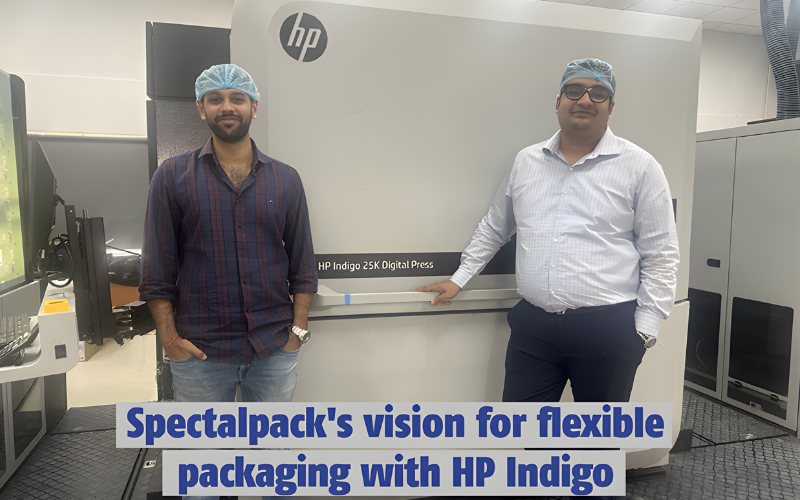Noel D’Cunha talks to with Priyesh Dalmia, co-founder of Spectalpack, in order to understand how the Bengaluru-based firm is committed to sustainability in the packaging industry
Spectalpack was founded on the vision of reimagining packaging to be agile, accessible, and sustainable, particularly for smaller and emerging brands often hindered by traditional packaging constraints. Priyesh Dalmia says, “Startups face high minimum order quantities, long lead times, and limited design flexibility. Therefore, Spectalpack’s core belief is that every brand, regardless of size, deserves packaging that tells its story boldly and responsibly.”
The demand for flexible packaging in India, especially in Bengaluru, is expanding due to e-commerce growth, urbanisation, consumer convenience, and sustainability shifts. Dalmia says, “Bengaluru, as a hub for startups and D2C brands, drives significant tech-driven demand and early adoption of sustainable solutions, positioning the city and the nation for continued momentum in this sector.”
Beyond food, FMCG, cosmetics, and personal care, Spectalpack serves nutraceuticals, confectionery, dairy and beverages; home and hygiene; and agro products, focusing on flexible packaging solutions across various industries. Working with 700 brands across India, Spectalpack’s business model is built around the agility required by Bengaluru’s fast-moving startup and D2C ecosystem. The company provides low MOQs, quick turnarounds, and design experimentation freedom, which keeps them innovative and drives demand.
The tech advantage
Spectalpack chose the HP Indigo 25K as its technology backbone due to its ability to deliver offset and gravure-quality printing with the agility needed for flexible packaging. This includes short runs, variable designs, and faster turnaround, eliminating the waste and long setup times of conventional methods. This technology provides customers with the freedom to launch quickly, test new SKUs, and personalise packaging.
Spectalpack ensures substrate compatibility with Indigo through surface treatment for strong ink adhesion, a certified media library covering various films, and in-house converting and lamination. They have invested in a complete Indigo-to-packaging workflow, including solvent-based and solvent-less lamination, slitting, pouch-making, die-cutting, and quality control, to deliver high-quality, ready-to-fill flexible packs efficiently.
All about startups and brands
Spectalpack positions itself as a collaborator in brand building with startups, offering support in design ideation, SKU testing, short-run flexibility, and speed to market. The company’s goal is to provide packaging solutions that protect products, enhance brand stories, and accelerate growth.
Spectalpack addresses startup challenges like high minimum order quantities (MOQs), long lead times, limited design flexibility, and inventory risks by leveraging digital flexible packaging for short runs, quick SKU changes, and rapid prototyping, enabling confident launches without excess stock or upfront costs.
Business growth and strategy
Currently, 40- to 45% of Spectalpack’s volume comes from startups and D2C brands, with the remaining 55-60% from established FMCG, personal care, and food brands. The rapid growth of the startup segment drives demand for digital flexible printing.
Dalmia says, “To convince brands of the value of digital short runs, Spectalpack delivers gravure-class quality, vibrant colours, and durability.” He emphasises how short runs reduce inventory risk, enable rapid SKU testing, and allow for seasonal or limited-edition launches, thereby unlocking growth opportunities and faster market response.
Future with sustainability
Sustainability is a core focus for Spectalpack. HP Indigo enables printing on recyclable films and laminates, and on-demand short runs reduce overproduction and waste. It also deploys eco-friendly substrates and optimises lamination and converting processes for recyclability. This approach combines digital agility with sustainable materials to help brands meet environmental goals without compromising quality or design. Dalmia also notes that avoiding the hazardous cylinder-making process of traditional printing through digital methods is environmentally friendly.
Flexible packaging mantra
While gravure and flexo dominate long runs, digital printing is becoming cost-competitive for brands requiring multiple SKUs, rapid design changes, and lower inventory risk. It offers total value through speed, flexibility, and reduced waste, playing an increasingly strategic role beyond just short runs.
Spectalpack views HP Indigo as more than a stop-gap for sustainability. When combined with appropriate substrates, it enables printing on recyclable films, mono-material laminates, and compostable substrates. Short-run production further reduces overproduction and waste, allowing brands to experiment sustainably while the market for more eco-friendly substrates evolves.
Startups understand that digital flexible packaging costs are justified by the agility, speed, and customisation it provides. Short runs, rapid SKU changes, and premium print quality enable market testing, faster launches, and reduced inventory risk, often proving more cost-effective than traditional long-run methods.
News Courtesy : Printweek



